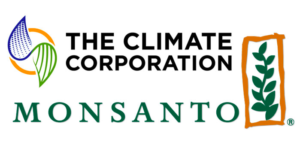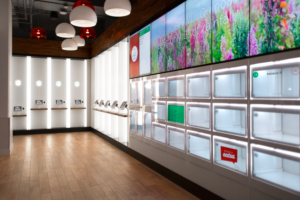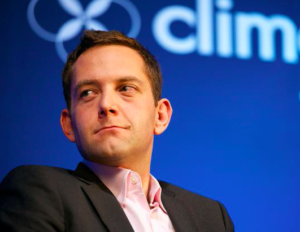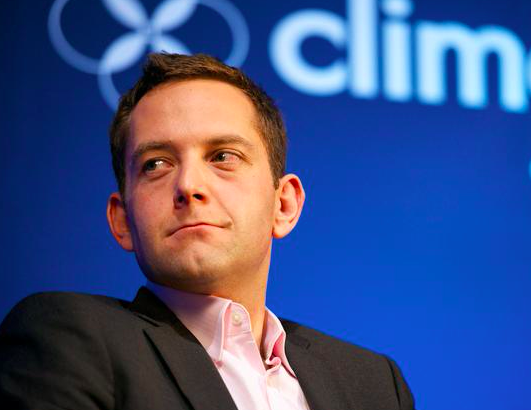This week’s Newton Lecture Series featured David Friedberg, best known to Berkeley students as the man who brought Eatsa—a tech-based restaurant seeking to revolutionize the production process—to our city. Friedberg’s resume, however, extends far beyond this quinoa-inspired endeavor.
Education and Background:
Friedberg graduated from the University of California, Berkeley in 2001, where he received his degree in astrophysics. During his coursework, he quickly realized that he enjoyed research where he felt he was being proactive and engaged, which led him to seek out businesses in Silicon Valley.
David first joined Google in 2004 when the company boasted only 1,000 workers. He liked environments with fast-pace and hands-on work, and decided he was interested in starting his own venture company. His next experiences defined his coming years as an entrepreneur.
WeatherBill turned Climate Corporation:
Friedberg’s first company, founded in 2006, was WeatherBill, an insurance business designed to predict and protect against bad weather. To create applicable data, the company bought 30 years of historical daily temperatures from 200 weather statio ns. Soon, David and his colleaues realized this information would be of most use to farmers, and they began creating software and analytical tools to not only forecast weather conditions, but also nitrogen projections that farmers could use to increase profits and reduce harmful effects on the environment.
ns. Soon, David and his colleaues realized this information would be of most use to farmers, and they began creating software and analytical tools to not only forecast weather conditions, but also nitrogen projections that farmers could use to increase profits and reduce harmful effects on the environment.
Due to its success, the company, renamed The Climate Corporation, was acquired by agricultural corporation Monsanto in 2013 for over a billion dollars. In regards to this, Friedberg noted the complexity of the relationship between science and technology, and peoples’ opinions of science. He encouraged engagement in science and facts, and said in a letter to his employees upon the sale of The Climate Corporation, “It seems to me that innuendo, anecdotal evidence, and out of context facts that are used to support a simple statement – ‘the company is evil’ – are rooted in a lack of understanding and fear of the unknown.”
Fair Auto turned M etromile:
etromile:
During Friedberg’s tenure at Climate Corp., he encountered the difficulties involved with creating a business as an insurance company. To this effect, he began exploring trends in the auto-insurance industry, and recalled realizing that the relationship between risk and loss was tied to miles.
This idea became Fair Auto, later rebranded as Metromile: a pay-per-mile auto insurance. Through a Metromile pulse device, customers could track their individual mileage and be automatically billed at the end of the month, creating a price advantage for them.
Quinoa-oa turned Eatsa:
If you’ve noticed a pattern in Friedberg’s company name evolutions, you’re not alone. Friedberg himself admits, “I’m terrible at naming companies.” Nevertheless, Eatsa was he result of studying the expansion of the middle class and its ensuing food-related behavior. Friedberg noted that he understood consumers wanted cheap, tasty, and convenient foods, while food producers wanted items that were nutritious and sustainable. In order to minimize tradeoffs, Friedberg became invested in the quinoa market.
Friedberg explained that quinoa has the highest ration of protein to resources required for production, making the grain not only appealing to producers, but consumers as well, if it can be presented as accessible and appetizing. Eatsa is still evolving and seeking to stay relevant, and Friedberg even took suggestions from his student-audience on how to improve the location next to campus.
Lessons:
Friedberg concluded his lecture by relaying a series of lessons he’d learned during his career. This included the profound idea that it was not the accuracy of the ideas you put forth, but the volume, that will determine the capacity to succeed in a quickly-changing startup market. Another bit of wisdom was Friedberg’s understanding that despite the best intentions, you cannot control everything. “Even if you’re progressing, 80% of the time you’re failing,” said Friedberg. This is where you learn, adapt, and persist.
This week’s Newton Lecture Series featured David Friedberg, best known to Berkeley students as the man who brought Eatsa—a tech-based restaurant seeking to revolutionize the production process—to our city. Friedberg’s resume, however, extends far beyond this quinoa-inspired endeavor.
Education and Background:
Friedberg graduated from the University of California, Berkeley in 2001, where he received his degree in astrophysics. During his coursework, he quickly realized that he enjoyed research where he felt he was being proactive and engaged, which led him to seek out businesses in Silicon Valley.
David first joined Google in 2004 when the company boasted only 1,000 workers. He liked environments with fast-pace and hands-on work, and decided he was interested in starting his own venture company. His next experiences defined his coming years as an entrepreneur.
WeatherBill turned Climate Corporation:
Friedberg’s first company, founded in 2006, was WeatherBill, an insurance business designed to predict and protect against bad weather. To create applicable data, the company bought 30 years of historical daily temperatures from 200 weather statio ns. Soon, David and his colleaues realized this information would be of most use to farmers, and they began creating software and analytical tools to not only forecast weather conditions, but also nitrogen projections that farmers could use to increase profits and reduce harmful effects on the environment.
ns. Soon, David and his colleaues realized this information would be of most use to farmers, and they began creating software and analytical tools to not only forecast weather conditions, but also nitrogen projections that farmers could use to increase profits and reduce harmful effects on the environment.
Due to its success, the company, renamed The Climate Corporation, was acquired by agricultural corporation Monsanto in 2013 for over a billion dollars. In regards to this, Friedberg noted the complexity of the relationship between science and technology, and peoples’ opinions of science. He encouraged engagement in science and facts, and said in a letter to his employees upon the sale of The Climate Corporation, “It seems to me that innuendo, anecdotal evidence, and out of context facts that are used to support a simple statement – ‘the company is evil’ – are rooted in a lack of understanding and fear of the unknown.”
Fair Auto turned M etromile:
etromile:
During Friedberg’s tenure at Climate Corp., he encountered the difficulties involved with creating a business as an insurance company. To this effect, he began exploring trends in the auto-insurance industry, and recalled realizing that the relationship between risk and loss was tied to miles.
This idea became Fair Auto, later rebranded as Metromile: a pay-per-mile auto insurance. Through a Metromile pulse device, customers could track their individual mileage and be automatically billed at the end of the month, creating a price advantage for them.
Quinoa-oa turned Eatsa:
If you’ve noticed a pattern in Friedberg’s company name evolutions, you’re not alone. Friedberg himself admits, “I’m terrible at naming companies.” Nevertheless, Eatsa was he result of studying the expansion of the middle class and its ensuing food-related behavior. Friedberg noted that he understood consumers wanted cheap, tasty, and convenient foods, while food producers wanted items that were nutritious and sustainable. In order to minimize tradeoffs, Friedberg became invested in the quinoa market.
Friedberg explained that quinoa has the highest ration of protein to resources required for production, making the grain not only appealing to producers, but consumers as well, if it can be presented as accessible and appetizing. Eatsa is still evolving and seeking to stay relevant, and Friedberg even took suggestions from his student-audience on how to improve the location next to campus.
Lessons:
Friedberg concluded his lecture by relaying a series of lessons he’d learned during his career. This included the profound idea that it was not the accuracy of the ideas you put forth, but the volume, that will determine the capacity to succeed in a quickly-changing startup market. Another bit of wisdom was Friedberg’s understanding that despite the best intentions, you cannot control everything. “Even if you’re progressing, 80% of the time you’re failing,” said Friedberg. This is where you learn, adapt, and persist.


